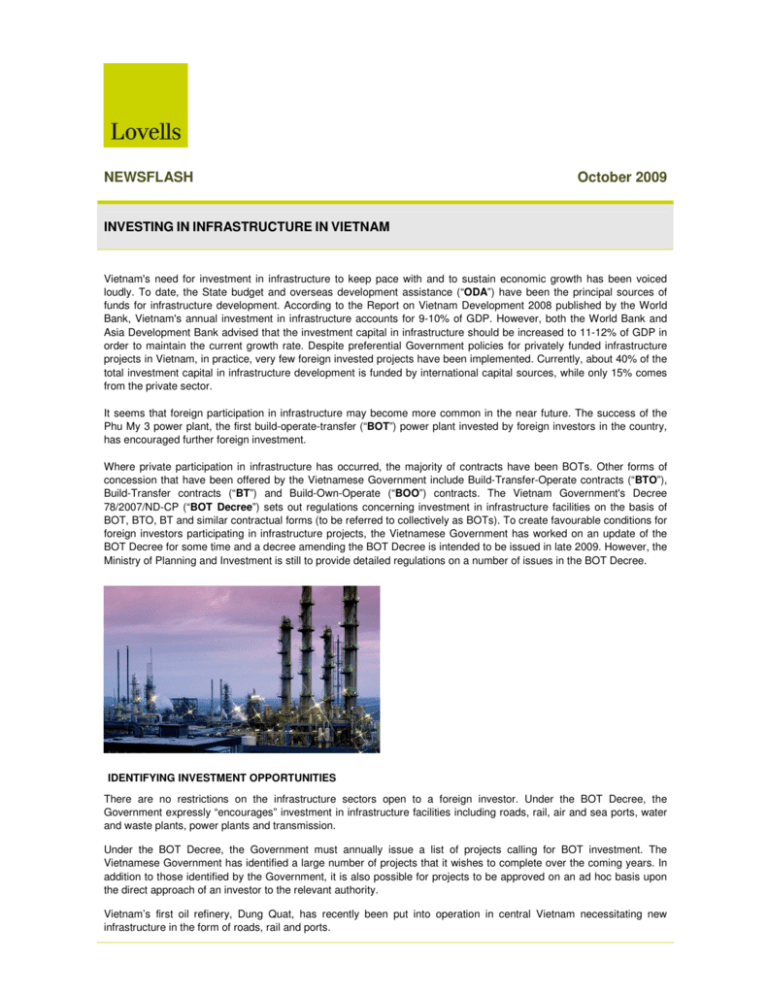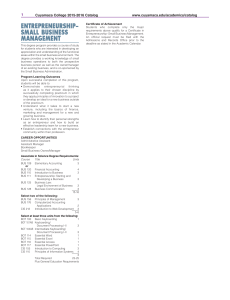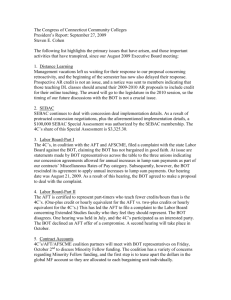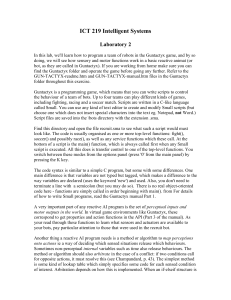
NEWSFLASH
October 2009
INVESTING IN INFRASTRUCTURE IN VIETNAM
Vietnam's need for investment in infrastructure to keep pace with and to sustain economic growth has been voiced
loudly. To date, the State budget and overseas development assistance (“ODA”) have been the principal sources of
funds for infrastructure development. According to the Report on Vietnam Development 2008 published by the World
Bank, Vietnam's annual investment in infrastructure accounts for 9-10% of GDP. However, both the World Bank and
Asia Development Bank advised that the investment capital in infrastructure should be increased to 11-12% of GDP in
order to maintain the current growth rate. Despite preferential Government policies for privately funded infrastructure
projects in Vietnam, in practice, very few foreign invested projects have been implemented. Currently, about 40% of the
total investment capital in infrastructure development is funded by international capital sources, while only 15% comes
from the private sector.
It seems that foreign participation in infrastructure may become more common in the near future. The success of the
Phu My 3 power plant, the first build-operate-transfer (“BOT”) power plant invested by foreign investors in the country,
has encouraged further foreign investment.
Where private participation in infrastructure has occurred, the majority of contracts have been BOTs. Other forms of
concession that have been offered by the Vietnamese Government include Build-Transfer-Operate contracts (“BTO”),
Build-Transfer contracts (“BT”) and Build-Own-Operate (“BOO”) contracts. The Vietnam Government's Decree
78/2007/ND-CP (“BOT Decree”) sets out regulations concerning investment in infrastructure facilities on the basis of
BOT, BTO, BT and similar contractual forms (to be referred to collectively as BOTs). To create favourable conditions for
foreign investors participating in infrastructure projects, the Vietnamese Government has worked on an update of the
BOT Decree for some time and a decree amending the BOT Decree is intended to be issued in late 2009. However, the
Ministry of Planning and Investment is still to provide detailed regulations on a number of issues in the BOT Decree.
IDENTIFYING INVESTMENT OPPORTUNITIES
There are no restrictions on the infrastructure sectors open to a foreign investor. Under the BOT Decree, the
Government expressly “encourages” investment in infrastructure facilities including roads, rail, air and sea ports, water
and waste plants, power plants and transmission.
Under the BOT Decree, the Government must annually issue a list of projects calling for BOT investment. The
Vietnamese Government has identified a large number of projects that it wishes to complete over the coming years. In
addition to those identified by the Government, it is also possible for projects to be approved on an ad hoc basis upon
the direct approach of an investor to the relevant authority.
Vietnam’s first oil refinery, Dung Quat, has recently been put into operation in central Vietnam necessitating new
infrastructure in the form of roads, rail and ports.
-2In recent years, power shortages have focused particular attention on the need for power investment while the port
sector is witnessing an increasing amount of private participation. Vietnam intends to invest US$3.5 billion into
developing its seaport systems to double its current cargo handling capacity to 250 million tons by 2010. However,
Vietnam’s need for investment extends well beyond these sectors.
Many power plants developed by local enterprises have already been put into operation and further power plants are
expected to be completed in the up coming years. Saigon Investment Group, a major local infrastructure developer, has
not long ago released a coal-fired power plant project worth nearly US$3 billion to be built in the form of joint venture
enterprise with foreign companies. The Government has also published a list of 13 power plant projects inviting foreign
investors to participate by way of joint venture with local partners.
AWARD OF PROJECTS
The Government has historically tended to award BOTs on a negotiated basis, rather than through competitive tender.
Under the BOT Decree, the “preferred” method of selection of an investor for a BOT contract is that of an international
or domestic tender. However, the direct appointment of an investor is still permitted in some circumstances, including
where a project is proposed directly by an investor and no other investors register to participate in the project. Of note,
the Ministry of Planning and Investment is required to issue provisions specifying the conditions and procedures for
selection of investors for project contract negotiations. A draft circular implementing the BOT Decree giving such
detailed provisions is currently being prepared and is expected to be passed in the near future.
Transparency has not historically been a feature of investor selection, but under the amended BOT Decree, approved
projects proposed by an investor will be included on the published list of projects calling for investment and if any other
investors register to participate in the project, it shall be put on tender in accordance with the regulations of the BOT
Decree.
A BOT contract is negotiated and executed between the investor and an authorised State body (“ASB”). An ASB may,
depending upon the size and sector of the project, be a ministry or ministry-level agency (such as the Ministry of Trade
or Ministry of Industry), a provincial People’s Committee or any subsidiary body thereof.
The cumbersome nature of Vietnamese bureaucracy has prevented many projects from achieving a successful close.
The BOT Decree does seek to better this track record by requiring an ASB to establish an “inter-branch working group”
which brings together relevant government bodies and independent advisers in a forum to consider the criteria for
selection of investors, assist in the negotiation of contracts and resolve implementation issues. Investors will have to
wait and see whether this forum tangibly reduces red tape.
TENDERING FOR CONTRACTORS
Where a project with a minimum of 30% State funding is tendered to the market, Vietnam’s 2005 Law on Tendering
governs the participation of foreign and domestic tenderers and describes the principal requirements of the tender
process and evaluation of tenderers. Foreign tenderers should be aware that preferential treatment is often given to
those who intend to employ local employees or utilise local materials in addition to those applicants who anticipate
introducing advanced technology.
Although the Law on Tendering acknowledges the right of tenderers to challenge the results of a tender, in practice, it
remains difficult for a disgruntled tenderer to have any recourse where they claim procedural unfairness.
INVESTMENT CERTIFICATES AND THE INVESTMENT VEHICLE
An investment certificate is required for a foreign investment project of any nature in Vietnam, including for the
implementation of a BOT or other infrastructure project.
The BOT Decree distinguishes between an investor (the company or individual investing capital in the project) and a
-3project enterprise (the joint venture vehicle set up by the investors to implement the project). The investment certificate
issued for the implementation of the BOT project will concurrently be the incorporation certificate of a project enterprise
with foreign participation.
Under the 2005 Investment Law, foreign invested enterprises may operate in a number of different forms, including a
limited liability company, a joint stock company, a private company or a partnership. The BOT Decree allows any form
of project enterprise established in accordance with the law on investment and the law on enterprises to be used. Our
experience suggests that joint ventures with a local partner will be regarded positively by Vietnamese authorities.
It is the investor that is appointed to enter into contract negotiations for a BOT project and, in the first instance, it is the
investor that must sign the project contract. Therefore, prior to the establishment of the project enterprise, the
obligations under the BOT contract remain exclusively with the investor. As a signatory to the BOT contract, an investor
can potentially expose itself to risks which it would ordinarily seek to confine in the project company, such as the
obligation to procure the construction and operation of the relevant plant and equipment. The BOT Decree does
contemplate that a project enterprise can “assume” the rights and obligations of the investor with respect to
“implementation” of a project, subject to the approval of the investment certificate issuing body. In practice, it would be
preferable for an investor to limit its risk by negotiating the BOT contract such that obligations are imposed directly on
the project enterprise.
CAPITAL REQUIREMENTS AND CONSTRUCTION SECURITY
Investors may raise all of the funds for a BOT project themselves or may be supported by State capital contributions.
Under the BOT Decree, capital contributions by State-owned enterprises cannot represent more than 49% of the
investment capital. The amended BOT Decree requires investors to provide minimum equity to the project company as
follows:
• not less than 15% equity where total investment capital is below VND1,500 billion (US$92.6 million); and
• not less than 10% equity where total investment capital is VND1,500 billion or more (exceeding about US$92.6
million).
Investors should note that the investment capital must be contributed in accordance with a schedule agreed in the
project contract, though it need not necessarily be in full on commencement of the project.
The BOT Decree also requires that investors offer security to guarantee implementation of the project contract.
LENDER’S SECURITY AND STEP-IN RIGHTS
Creditors’ rights have traditionally been very limited under Vietnamese law. Lenders have historically relied on the
strength and breadth of their step-in rights to salvage an investment in the circumstances of project company default. In
a BOT context, a lender’s step in rights must be pre-approved by the relevant ASB counterparty. However, in practice, it
may be difficult for lenders to obtain sufficiently broad consent to cover all the circumstances where a lender may wish
to step into a project experiencing distress.
Whilst the introduction of the 2004 Bankruptcy Law was a welcome development for creditors, limitations remain as to
the form of security available to project lenders. In particular, foreign lenders cannot take security over the “land use
rights” or the structures on the land constructed by a project company unless they have a foreign bank branch in
Vietnam. There are examples of syndicated lending (comprising local and foreign banks), but the enforcement of their
security remains untested. A number of BOT projects have failed to be bankable in light of this restriction.
TRANSFER OF PROJECT CONTRACT
The BOT Decree allows investors to transfer their rights and obligations under the project contract in whole or in part.
-4Such transfer is, however, subject to the prior approval of the investment certificate issuing body. Further, the parties
shall agree on conditions and procedures for such transfer of rights and obligations in the project contract.
In addition to transfer of the project contract, investors are also permitted to adjust or supplement the signed project
contract due to changes in scale, technical criteria of the works, agreed total investment capital or due to events of force
majeure as defined in the contract. The project contract shall set out the conditions and procedures for amendments
and supplements.
GOVERNMENT GUARANTEES
Investors have previously had some success in obtaining Government guarantees to support the obligations of the
State-owned enterprise, which may be the relevant project off taker, or to ensure the conversion of project revenues into
foreign exchange. A requirement for the Prime Minister's approval of a Government guarantee prior to contract
negotiations was abandoned with the amended BOT Decree. Thus, the Government may grant a Government
guarantee at any stage of the BOT project. To date, the two projects that have been internationally financed (Phu My
2.2 and Phu My 3) were both supported by central Government guarantees.
INCENTIVES FOR INVESTMENT
There are various incentives for investors undertaking a BOT project. These include exemption from applicable land use
fees or land rent, exemption from import duties on goods imported to implement the project, as well as reduced
corporate income tax and tax holidays for investments in development of infrastructure in sectors listed as entitled to
special investment incentives. Of note, a new Law on Corporate Income Tax (CIT) came into effect on 1 January 2009
amending the CIT incentives available to specially important infrastructure projects. It may be possible for investors to
negotiate additional incentives for a particular project.
OTHER FORMS OF PRIVATE PARTICIPATION
Whilst BOTs have been the dominant means of private participation in infrastructure in Vietnam, there are other
contractual options to enable private participation in infrastructure. These include construction, service or management
contracts (in particular, the construction of ODA-funded projects and other infrastructure projects, such as Tan Son
Nhat’s International Airport Terminal and Dung Quat Refinery). Full privatisation may also be possible (as, for example,
indicated by the Ministry of Industry for IPPs) although to date, only domestic enterprises have received licences to own
and operate power plants and other infrastructure facilities where the assets remain indefinitely with the private sector.
-5BOT PROJECT STRUCTURE
Projects proposed by State
authorities
Projects proposed and formulated by
investor
Project-proposals formulated by
independent consultant
Approval of proposed projects*
Publication of annual list of projects
calling for investment
Tendering for selection of investor
for contract negotiation
Appointment of investor to enter directly into
project contract negotiations
Preparation and approval of
investment project
Negotiation and signing of project
contract and related agreements
Submission of application for
issuance of Investment Certificate
(IC)**
Establishment of project
enterprise/issuance of IC (project
funded by foreign capital)
Establishment of project enterprise/issuance
of BRC or amendment of BRC (project
funded by local investors)
Implementation of investment
project
Operation of project
Transfer of facility to the State and
termination of project contracts
* Group A project are approved by the Prime Minister, while Group B & C projects are approved by the relevant Ministry, Branch or
provincial People’s Committee. Categorisation of projects into Group A, B or C is made in accordance with the Law on Investment.
** The Ministry of Planning and Investment or the provincial People’s Committee will be the Investment Certificate Issuing Body
depending on the project.
Back to top>>
For further information and assistance, please contact the below contacts or the person you usually deal with at Lovells:
Christian Schaefer, Senior Associate, +84 83 829 5100, christian.schaefer@lovells.com
James Harris, Local Managing Partner, +65 6 3022 552, james.harris@lovells.com
-6-
This e-mail is provided for information only in general terms. It should not be relied upon as a substitute for specific legal advice. If you would like any
further information on any of the matters raised in this e-mail, please contact the person at Lovells with whom you usually deal.
So that we can send you this newsletter and other marketing material we believe may interest you, we keep your e-mail address and other information
supplied by you on a database. The database is accessible by all our offices, including offices outside the European Economic Area (EEA) where the
level of protection for personal data may not be as comprehensive as within the EEA. We will not disclose any of your information to third parties
unconnected with Lovells other than our data processors or as required by law. If you do not wish us to use your information for marketing purposes,
please email unsubscribe@lovells.com .
This is a commercial communication from Lovells, an international legal practice comprising Lovells LLP and its affiliated businesses. Lovells LLP is a
limited liability partnership registered in England and Wales with registered number OC323639. Registered office and principal place of business: Atlantic
House, Holborn Viaduct, London EC1A 2FG.
The word "partner" is used to refer to a member of Lovells LLP, or an employee or consultant with equivalent standing and qualifications, and to a partner,
member, employee or consultant in any of its affiliated businesses who has equivalent standing.
Prior results do not guarantee a similar outcome. Some of this material may constitute attorney advertising within the meaning of sections 1200.1 and
1200.6-8 of Title 22 of the New York Codes, Rules and Regulatory Attorney Advertising Regulations. The above statement is made in accordance with
those rules should this material be relevant.
© Lovells LLP 2009. All Rights Reserved





